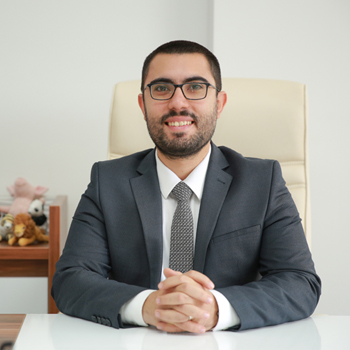“Special Populations in Feeding and Swallowing: Examination of Structural, Motor and Sensory Complications” konulu eğitimimiz 27-28 Eylül tarihlerinde Cuyler M. Romeo, OTR, M.O.T., SCFES tarafından merkezimizde gerçekleştirilecektir.
Yutma ve Beslenme Terapisine yönelik “Special Populations in Feeding and Swallowing: Examination of Structural, Motor and Sensory Complications” konulu eğitimimiz 27-28 Eylül tarihlerinde Retorya Dil, Konuşma ve Gelişim Merkezinde Cuyler M. Romeo, OTR, M.O.T., SCFES tarafından gerçekleştirilecektir. Eğitime konuşma terapistleri, özel eğitim uzmanları, fizyoterapistler, duyu bütünleme uzmanları ve hekimler katılabilir. Kontenjan sınırlı olduğu için erken kayıt yapanlara öncelik verilecektir. Kayıt için 02123567711-05389413711 numaralarını arayabilirsiniz. Eğitim programı ve eğitmenin özgeçmişi aşağıda yer almaktadır.
Special Populations in Feeding and Swallowing: Examination of Structural, Motor and Sensory Complications with Cuyler M Romeo, OTR, M.O.T., SCFES
Course Description
Feeding may be described as one of the great pleasures of life and indescribably valuable in maintaining health and wellbeing throughout the lifespan. Children born without insult or injury often are successful in this endeavor without specialized care. However, certain populations, such as children impacted by craniofacial (CF) abnormalities, neurological insult or developmental challenges such as Autism Spectrum Disorder (ASD), may require advanced care to ultimately enjoy eating. Specifically, when an infant is born with a craniofacial (CF) anomaly or motor challenge normal breathing and feeding can be disrupted, which can negatively impact respiratory health, nutrition, oral-motor development and caregiver bonding. There is a very broad range of feeding and swallowing problems related to structural and functional differences; therefore early differential diagnosis of an infant’s feeding and swallowing function is essential so that appropriate therapeutic intervention can be established. CF anomaly and motor disorders are rarely static in their presentation; continual reassessment and establishment of new therapeutic intervention strategies are needed. Furthermore, sensory based challenges may add additional complexity to food refusal resulting from CF anomalies, motor disorders, and developmental disorders (ASD). This course will provide the feeding clinician sound physiological understanding of the origination of such challenges and investigate sustainable family driven solutions.
On Day 1, craniofacial abnormalities and motor complications will be examined. As a broad range of feeding and swallowing problems related to structural and functional differences exist, participants will first develop evaluation techniques specific to these populations. Once evaluation pathways have been established, participants will gain understanding of intervention techniques such as the use of specialized feeding systems, vessel presentation, environmental modification, postural support exercises and oral motor activities.
On Day 2, sensory complications will be examined. Children with ASD often have lifelong feeding challenges such as extremely narrow diets, inability to accept novel foods, difficulty eating socially and resulting poor nutritional status. Participants first will develop a better understanding of how children with ASD view food in order to guide assessment and intervention planning. Sensory techniques such as desentization, food exploration, and enjoyment of food variance will be covered. As lifelong skill development depends on integration into family routine, family education and involvement will be addressed in relation to establishing a new definition of mealtime success.
Course work will be participant focused. Participants are strongly encouraged to bring challenging case studies to be explored throughout the sessions. Learning will be supported via didactic lecture, video presentation, case study analysis and hands on practicum.
Course Objectives
As a result of this course participants will be able to:
1. Recognize and classify types of orofacial clefts and complex CF anomalies;
2. Evaluate and describe feeding and swallowing disorders related to CA anomalies and motor dysfunction based on anatomical and physiological factors;
3. Outline key considerations in generating an assessment and treatment plan for children with CA and motor complications;
4. Identify 3 primary challenges for children with ASD in regards to overall development and describe related effects on food enjoyment;
5. Define extreme food hyperselectivity and identify the underlying cause of food aversion in children with hyperselectivity;
6. List at least 3 pleasurable ways to include a child in the mealtime experience;
7. Outline the skills needed for lifelong eating success for children with sensory challenges;
8. Develop family empowerment strategies for successful mealtimes in children with hyperselectivity.
Course Schedule
Day 1
9:00-9:15: Oro-facial and CF anomalies (syndromes) and their impact on feeding and swallowing
9:15-10:15: Surgical management and implications on feeding, the feeding relationship and nutritional status.
10:15-10:30: Break
10:30-12:00: Assessment and treatment strategies for CA. Case study presentation will provide basis for hands on practice using specialized feeding systems and handling techniques.
12:00-1:00: Lunch
1:00-2:00: Motor dysfunction related to feeding and swallow: implications for breast, bottle and beyond.
2:00-2:45: Assessment strategies for motor dysfunction. Hands on practice of motor handling for the purpose of assessment.
2:45-3:00: Break3:00-4:00: Intervention strategies for motor based feeding challenges. Case study presentation will outline strategies for bottle, cup, spoon and straw. Hands on practice of strategies and round table discussion opportunities.
Day 2
9:00-9:45: Introduction to ASD and establishment of the family context.
9:45-10:30: Definition of extreme hyperselectivity and associated symptoms related to food aversion, sensory limitations, and nutrition
10:30-10:45: Break
10:45-12:00: Redefining mealtime success and assessment strategies for children with sensory
complication.
12:00-1:00: Lunch
1:00-1:45: Sensory treatment options for children with extreme food hyperselectivity.
1:45-2:00: Break
2:00-3:00: Case study applications of treatment strategies with opportunity for hands on practice. Specific strategies to include: therapeutic food play, systematic introduction of food sensory change, mealtime involvement games, behavior support techniques.
Open discussion; questions and answers session will be conducted at the completion of course
Recommended Participants
Speech Language Pathologists/Speech Therapists; Occupational Therapists; Physical Therapists; nutritionists; early intervention specialists; caregivers for children with special needs; social workers; nurses, educators, physicians, etc.
Presenter
Cuyler M Romeo, OTR, M.O.T., SCFES
Director of Clinical Innovation; THERAPY 2000
Feeding Program Director; High Risk Infant Program Director
Cuyler M Romeo, OTR, M.O.T., SCFES completed her Masters level occupational therapy training at the University of Texas Health Science Center in San Antonio, Texas and discovered her passion for medically fragile infant feeding while completing her clinical fellowship in a Level 3 NICU. Cuyler pursued this specialty by working as a feeding therapist at Tucson Medical Center in Tucson, Arizona in both the in-patient (NICU, PICU, well baby) and out-patient settings while earning her therapeutic handling certification in TAMO®. She later joined a group of feeding therapists as a founding partner of Mealtime
Connections, LLC, a pediatric feeding specialty clinic serving Southern Arizona. As a partner, Cuyler had the opportunity to mentor under fellow partner Marsha Dunn Klein, Med, OTR/L and promote a global approach to feeding through education, lecturing, and advocacy. Cuyler returned to her home state of Texas in 2010 and continued to expand her feeding skills while working for Cook Children’s Hospital in Fort Worth, TX. She earned her AOTA board specialty certification in Feeding, Eating and Swallowing in 2012 and currently serves on the BASC board for AOTA. She re-entered home health in 2012 and currently serves at the Director of Clinical Innovation for Therapy 2000, a pediatric home health agency serving over 7 metropolitan areas across the state. Her role includes development and execution of the High Risk Infant and Feeding Programs which allows Cuyler to continue focusing her efforts on program development, professional lecturing and direct teaching. Additional specialty certifications include: PA approach for therapeutic handling Level 1 and 2, instructor of infant massage for special needs children (CIMI), VitalStim certification, General Movements Assessment certification, S.O.S. trained, Beckman trained, NOMAS trained, and current pursuit of instructor level PA approach for therapeutic handling.





